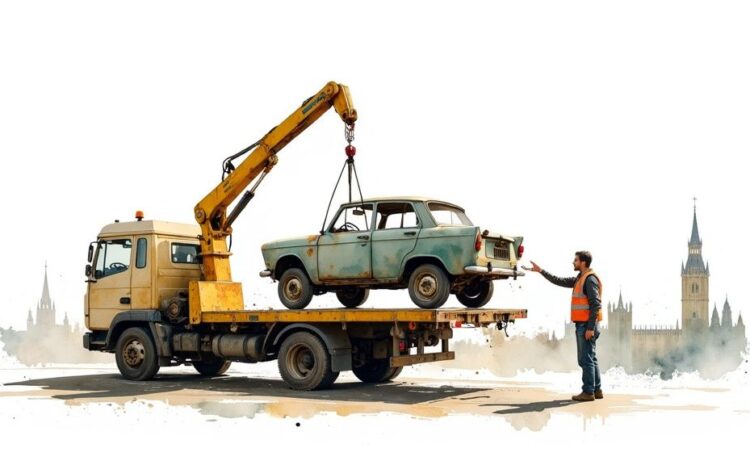
How to Scrap a Car in Harrow: The Complete 2025 Local Guide
So, your old car has finally given up the ghost. Getting it scrapped in Harrow isn't nearly as complicated as it might sound. The whole process is actually quite simple: you get a quote, arrange for the car to be picked up, and sort out the DVLA paperwork. Do it right, and you'll get paid and have your official Certificate of Destruction in no time, proving the car is no longer your responsibility.
Your First Steps to Scrapping a Car in Harrow
When your car is officially off the road for good, knowing the proper, legal way to scrap it in Harrow is crucial. This isn't just about clearing space on your drive; it's a regulated process that protects you from any future fines or legal headaches and ensures the vehicle is recycled responsibly.
The first, and most important, thing you need to do is find a government-approved Authorised Treatment Facility (ATF). These are the only places in the UK legally allowed to scrap cars. Dealing with an ATF is your guarantee that you'll get a Certificate of Destruction (CoD), the official document that legally severs your ties to the vehicle.
The Core Process at a Glance
Getting your old car from driveway ornament to recycled metal really just involves a few key stages. You’ll start by gathering quotes—any decent service will give you an instant valuation based on your car’s details. Once you've got an offer you like, you'll book a collection slot that suits you. Most companies will even pick it up for free.
On collection day, you just need to have your V5C logbook (or at least the relevant section) and the keys ready. They'll take the car, and you'll get paid by bank transfer.
This image breaks down the main steps visually.
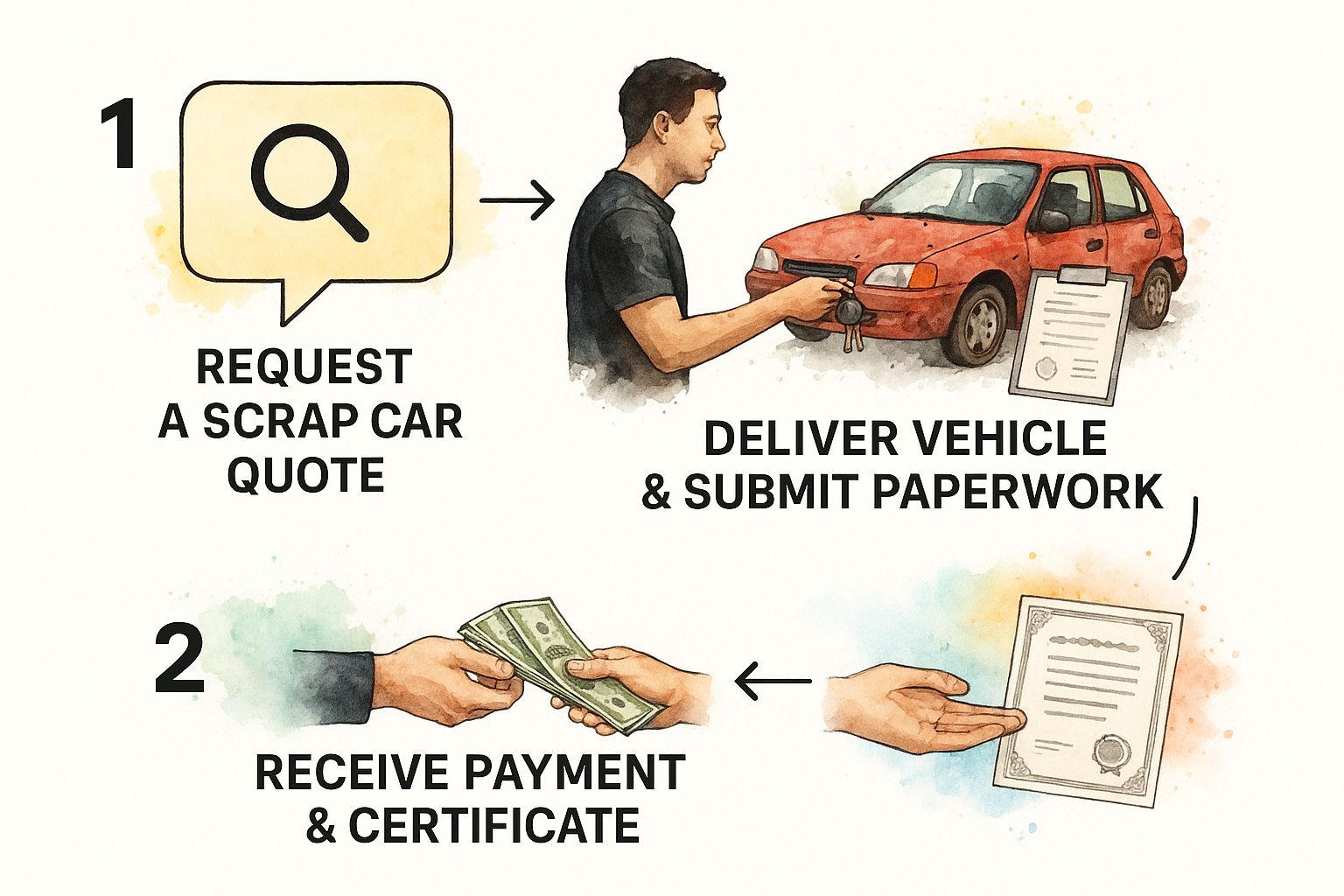
As you can see, it boils down to three manageable actions: getting a quote, getting the car ready for pickup, and completing the disposal paperwork.
To give you a clearer picture, here’s a quick summary of the whole journey.
Harrow Car Scrappage at a Glance
This table breaks down the entire process into simple, actionable stages.
| Stage | What You Need to Do | Key Document or Outcome |
|---|---|---|
| 1. Getting a Quote | Contact an Authorised Treatment Facility (ATF) with your car's registration and postcode. | An instant, no-obligation scrap value. |
| 2. Arranging Collection | Accept the offer and schedule a convenient time for free collection. | A confirmed pickup date and time. |
| 3. Handover | Give the driver your V5C logbook (or Section 9) and keys. Sign the paperwork. | Payment via bank transfer. |
| 4. Legal Disposal | The ATF recycles your car according to environmental regulations. | Certificate of Destruction (CoD) issued. |
Following these steps ensures everything is handled legally and you have all the right proof.
What Harrow Residents Need to Know
The good thing about living in Harrow is that you've got plenty of local services to choose from. Opting for a local ATF often means you can get your car collected much faster. Before you agree to anything, just make sure the company is fully licensed and check out some local reviews. You can find more details about dedicated scrap car services in the Harrow area to help you pick a trustworthy firm.
The single most important rule to remember is this: never, ever accept cash for your scrap car. The Scrap Metal Dealers Act of 2013 made cash payments illegal to help stop metal theft. A legitimate company will always pay you by bank transfer or cheque, giving you a clear paper trail.
Finishing the process correctly is just as vital as starting it properly. Once your car is collected, the ATF has seven days by law to issue your Certificate of Destruction. They send this to the DVLA, which officially takes the vehicle out of your name. Always keep a copy for yourself—it’s the ultimate proof you’re no longer the registered keeper. Without it, you could face fines if the car is ever found dumped.
How Is a Scrap Car Valued? Getting a Fair Price in Harrow
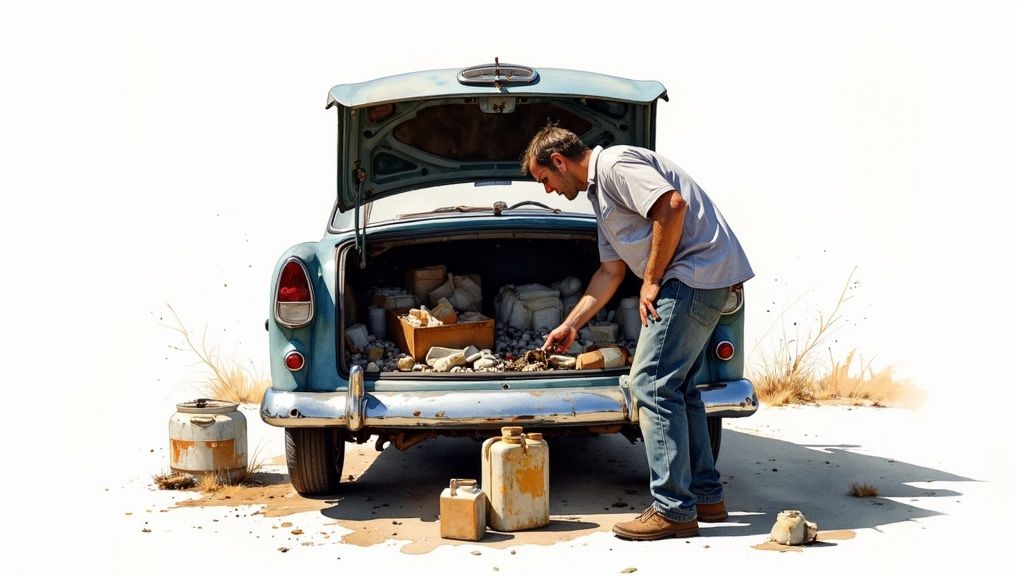
When you’re ready to scrap your car in Harrow, the first thing you'll want to know is, "What's it actually worth?" It’s a great question, but there's no single, fixed answer. The value is a moving target, shifting daily based on a few key factors. Getting to grips with these will help you understand the quote you receive and spot a lowball offer from a mile off.
The biggest piece of the puzzle is your car's kerb weight. At its core, scrapping is about recycling metal, and scrap metal is a commodity traded by the tonne. It’s simple maths, really: a heavier car means more metal, which means more money from the scrapyard.
This is why a big, chunky Land Rover Discovery will always fetch a better price than a little Ford Fiesta, even if they're the same age. The starting point for any valuation is that basic equation: more weight equals more cash.
It’s More Than Just a Weigh-In
While weight sets the foundation, Authorised Treatment Facilities (ATFs) look at more than just the scales. The specific make and model of your car are hugely important. Some vehicles are packed with valuable components that can be salvaged and sold on before the rest of the car is crushed.
For instance, certain models might have in-demand catalytic converters, alternators, or gearboxes that are still in good nick. A savvy ATF will factor in the potential resale value of these parts when they give you a quote. This is where a lighter car might just surprise you and punch above its weight class.
The UK's scrap car market is a big business, worth around £1.42 billion, and there are clear trends in which cars command the best prices. Premium vehicles tend to bring in higher returns because of their high-quality parts. It’s been shown that a Range Rover Vogue can be quoted at 201% above the market average. Models like the Volkswagen Touareg and BMW X5 also do exceptionally well.
The Bottom Line: Your quote is a mix of your car's raw metal weight and the current market demand for any salvageable parts. For the most accurate price, be upfront about your car’s make, model, and general condition.
The Fluctuating Price of Scrap Metal
The value of scrap metal isn’t set in stone. It’s a commodity market, just like oil or gold, with prices for steel, aluminium, and copper bobbing up and down daily based on global supply and demand. This is why a quote you get one week might be slightly different the next.
Any reputable ATF in Harrow will base their offer on the live market rate. Because of this volatility, it’s a good idea to act reasonably quickly once you get a quote you're happy with. Most offers are only valid for a limited time. If you want to see how these factors come together, our guide on how much scrappage your car is worth breaks it down even further.
Sometimes, a car ends up on the scrap heap after an insurance write-off. If your car has been in a collision and deemed a 'total loss', understanding a 'total loss' appraisal can give you some useful context.
Tips for Getting the Best Price
Want to make sure you’re getting the most cash for your car? A little bit of prep can make a big difference.
- Leave it Intact: It can be tempting to pull off the battery or sell the tyres separately, but this nearly always backfires. ATFs quote for a complete vehicle, and if parts are missing, they'll knock money off the price.
- Shop Around: Don’t take the first offer that comes your way. Get in touch with a few licensed ATFs in and around Harrow to compare their quotes. It gives you a feel for the true market rate and a bit of negotiating power.
- Be Honest: Give them the full picture. Does it start? Are all the parts there? A truthful description helps the ATF give you a solid quote they won't try to change on collection day.
Sorting Out the Essential DVLA Paperwork
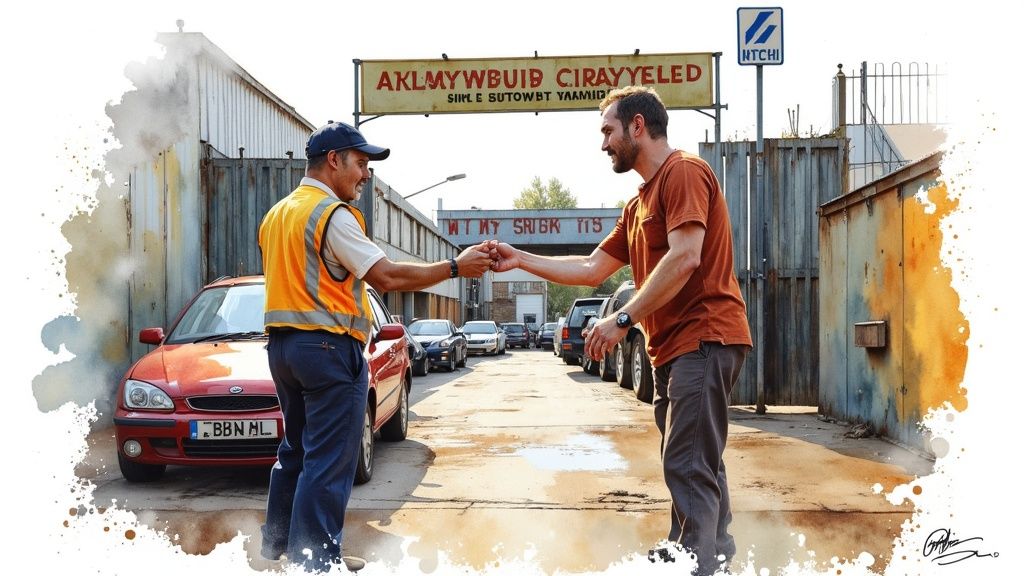
When it's time to scrap your car in Harrow, getting the DVLA paperwork right isn't just a box-ticking exercise—it's the law. A simple mistake here can lead to some real headaches down the line, from surprise fines to being legally responsible for a car you don't even have anymore.
Thankfully, it's not as daunting as it sounds once you know what's what. The key is understanding your role and the scrapyard's role in the process.
Getting the V5C Logbook Right
The most important document you’ll handle is the V5C registration certificate, or logbook. Think of it as the legal tie between you and your vehicle. The main goal when you scrap your car is to cut that tie cleanly and officially.
Your V5C is split into different sections. You only need to worry about the bit for selling or transferring to the motor trade.
- For logbooks issued after April 2019, this is Section 4.
- For older logbooks (before that date), you'll need Section 9.
When the driver from the Authorised Treatment Facility (ATF) arrives, you'll fill this specific section out with the date, sign it, and hand just that perforated slip over to them. They need it to begin their part of the process.
Crucially, you keep the rest of the V5C logbook. Don't be tempted to hand the entire document over. You need it to tell the DVLA yourself that the car has been sold to a motor trader (which is what an ATF is classed as). This dual-notification system is your best protection against things going wrong.
My Top Tip: Don't wait for the scrap yard to notify the DVLA. Head straight to the GOV.UK website and do it online yourself. It takes five minutes, and you'll get an immediate email confirmation. That email is your first piece of solid proof that you've done your part.
Showing Proof of Who You Are
When the collection driver turns up, they'll need to check your ID. This isn't them being nosy; it’s a strict legal requirement under the Scrap Metal Dealers Act 2013. This law was brought in to clamp down on vehicle theft, so every licensed facility has to follow it to the letter.
Have these ready for collection day:
- Photo ID: A valid photocard driving licence or your passport.
- Proof of Address: A recent utility bill or bank statement from the last three months. The address on it must match what’s on the V5C.
Any reputable Harrow ATF will always ask for this. It’s a clear sign you’re dealing with a professional outfit that does things by the book.
What if the V5C is Lost?
It happens more often than you’d think. You're all set to get rid of the car, but the V5C has vanished. Don't worry, you can still scrap it, but you need to take an extra step.
If you don't have the V5C, you must tell the DVLA you've disposed of the vehicle by writing a letter.
Make sure your letter includes:
- Your full name and address
- The car's registration number, make, and model
- The date you transferred it to the scrap yard
- The full name and address of the ATF
Pop it in the post to: DVLA, Swansea, SA99 1BD. I’d strongly recommend sending it by recorded delivery. That way, you have a receipt proving you’ve told them, which covers you completely.
The Final Piece of the Puzzle: The Certificate of Destruction
The last, and arguably most important, document you’ll get is the Certificate of Destruction (CoD). This is the official death certificate for your car, and only a licensed ATF can issue one. It's the ultimate proof that your vehicle is off the road for good.
The ATF is legally required to produce the CoD within seven days of collecting your car. They will then send it directly to the DVLA, which officially ends your responsibility for the vehicle. Make sure you get a copy for your own records, whether by email or post. Once you have that CoD, you can relax, knowing the job is done properly.
Choosing a Proper Authorised Treatment Facility
When it's time to scrap your car in Harrow, you can't just hand the keys over to any old garage or 'man with a van'. It’s a common misconception, but the law is crystal clear: your end-of-life vehicle has to be processed by a licensed Authorised Treatment Facility (ATF).
These are the only places officially approved by the Environment Agency to handle car scrappage. They're held to high standards for safely depolluting vehicles—removing oils, battery acid, and other nasties—before recycling the rest. Using a proper ATF isn’t just about ticking a box; it’s the only way to be sure your car is legally and permanently taken off the DVLA's books, protecting you from any future fines or penalties.
How to Check if a Scrap Dealer is Legit
Doing a quick background check on a scrap company is easier than you might think, and it’s well worth the few minutes it takes. Every single legitimate ATF is listed on the Environment Agency's public register. Before you agree to anything, this should be your first port of call.
A quick search on their website using the company's name or address will tell you everything you need to know. If they're not on that list, simply walk away. It's the quickest and most effective way to weed out the cowboys who could end up causing you a lot of headaches down the line.
Any trustworthy local ATF will be completely upfront about their status and should have no problem giving you their licence number. They know it's a mark of their credibility.
Dodging the Unlicensed Operators: The Red Flags
Unfortunately, there are still unlicensed scrap dealers out there, often trying to lure people in with tempting offers. Knowing what to look out for is your best defence.
Keep your eyes peeled for these classic warning signs:
- Paying in cash: This is the biggest red flag. The Scrap Metal Dealers Act of 2013 made it illegal for anyone to pay cash for a scrap car. A legitimate ATF will always pay you by bank transfer or cheque, creating a clear, traceable record of the transaction.
- Being cagey about the CoD: The Certificate of Destruction (CoD) is your official proof that the car is gone for good. If a company fobs you off or says you don't need one, they are not a licensed ATF. End of story.
- Shady contact details: Be wary of operators with no fixed address, just a mobile number, or a flimsy-looking website. Professional outfits have proper premises and are easy to get in touch with.
Sticking with a local Harrow-based ATF usually makes life easier, too. They can often arrange collection much faster, and it’s typically free of charge. Plus, a local business has a local reputation to protect, which makes them far more accountable.
Choosing a certified ATF is about more than getting a few quid for your old motor. It's about doing right by your legal duties as the registered keeper and supporting a system that recycles vehicles responsibly.
The UK actually has a fantastic track record when it comes to vehicle recycling, regularly hitting reuse and recovery rates of nearly 95%. This is all thanks to the strict regulations that ATFs operate under. You can learn more about the impressive state of UK scrap car recycling and see how the whole process contributes to a greener economy.
By making sure you use a licensed facility, you're playing a key part in that success, ensuring your old car's hazardous bits are disposed of safely and its valuable materials live on.
What to Expect on Collection Day
You've got your quote sorted and the paperwork lined up – now for the final bit: collection day. This is when your old car officially starts its new life as recycled metal. Knowing what’s coming will make the whole thing a smooth, hassle-free experience.
It's actually a pretty simple process. The driver from the Authorised Treatment Facility (ATF) will show up at your Harrow address at the time you arranged. First things first, they’ll give the car a quick once-over.
Don’t worry, this isn't a full MOT. They're just there to confirm the vehicle is what you said it was. They’ll check the make and model and make sure all the important bits are still attached – the engine, wheels, and especially the catalytic converter. As long as it all matches the details you gave for your quote, you’re good to go.
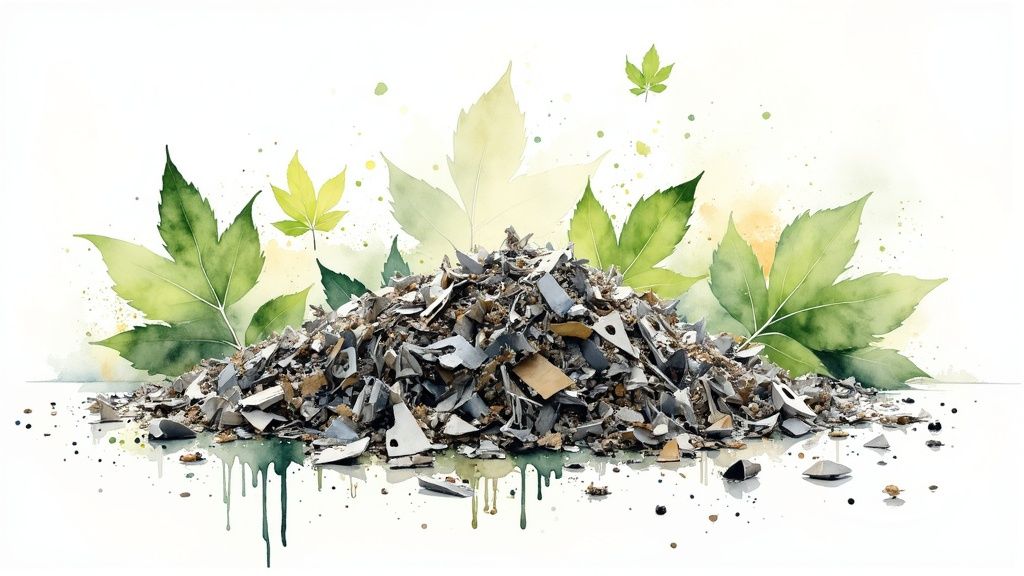
The Handover and Getting Paid
Remember that bit of your V5C logbook you filled out? Now’s the time to hand it over. You give the driver that slip – and only that slip – along with the car keys. They’ll have a form for you to sign, which is basically a receipt to say they've officially taken the car off your hands.
With the paperwork sorted, it's payment time. It’s really important to remember that since the Scrap Metal Dealers Act of 2013, paying cash for scrap cars is illegal. This law was brought in to clamp down on metal theft, and any legitimate business will stick to it rigidly.
Any licensed, reputable ATF will pay you by one of two methods:
- Instant Bank Transfer: This is what most companies do now. The driver can make the payment right there and then, and you can even open your banking app to see the money land in your account before they drive away.
- Cheque: It's less common these days, but some scrap yards might still offer to pay by cheque.
If anyone tries to pay you in cash, that’s a massive red flag. Politely decline the collection and find another company – an operator willing to break this law is not one you want to deal with.
Securing Your Proof of Disposal
The car is on the lorry and you’ve been paid. But there’s one last, crucial piece of the puzzle you need to get: the Certificate of Destruction (CoD). This is the official DVLA document that confirms your car has been properly destroyed and you’re no longer responsible for it.
The Certificate of Destruction is your legal shield. Without it, you could still be held liable for any future fines or penalties associated with the vehicle, even long after it has left your possession. It is the single most important document you will receive in this entire process.
The ATF is legally required to issue this certificate within seven days of scrapping your car. They’ll usually email or post a copy to you, and they also update the DVLA’s records directly on their system.
If a week goes by and you haven’t seen your CoD, get on the phone to the ATF. A professional outfit will understand how important it is and sort it out for you straight away. Once that certificate is in your hands, you can finally sit back and relax, knowing the job is done, dusted, and completely by the book.
How London's ULEZ and VED Can Force Your Hand
Let's be honest, deciding to scrap a car in Harrow isn't usually a spur-of-the-moment thing. It's often the result of mounting pressures, and for anyone living in or around London, two government policies loom particularly large: the Ultra Low Emission Zone (ULEZ) and the annual Vehicle Excise Duty (VED).
Getting a handle on these regulations isn't just about red tape; it's a strategic move. Knowing how they work can help you pick the perfect moment to scrap your car, possibly securing a better price or even tapping into a grant.
The ULEZ has been a real game-changer. It's effectively put an expiration date on thousands of older cars. If you're driving a petrol car that isn't at least Euro 4 or a diesel that isn't Euro 6, you face a daily charge just to move it around the city. For many people in Harrow, that daily cost quickly adds up to more than the car is even worth. Scrapping becomes the only sensible option.
What About TFL's Scrappage Schemes?
To ease the transition, Transport for London (TFL) sometimes offers scrappage schemes. These can be a lifeline, offering a grant to scrap your non-compliant car that’s often much higher than its simple scrap metal value.
But here’s the crucial bit: these schemes aren’t always running, and they come with very specific rules. Always check the official TFL website for the latest updates before you agree to scrap your car with a standard authorised treatment facility.
If you find you’re eligible, it’s a fantastic opportunity. Taking the time to understand how a scrappage scheme works is vital to make sure you follow all the steps correctly and get the full payout you're entitled to.
The Slow Burn of Road Tax
While ULEZ is an immediate, in-your-face cost, don't overlook the impact of Vehicle Excise Duty (VED), or what we all know as road tax. Every so often, the government tweaks the VED bands. Suddenly, that older, higher-emission car can become significantly more expensive to keep taxed and on the road, pushing you closer to the decision to scrap.
It’s all connected. These tax changes and wider economic trends ripple through the car market. When new car sales dip, fewer people trade in their old bangers. This can actually affect the number of cars entering the scrappage system in places like Harrow, which in turn influences scrap prices.
By keeping an eye on these London-specific policies and national tax shifts, you can make a much smarter decision about when to finally say goodbye to your old car, ensuring you get the best possible financial return.
Got Questions About Scrapping Your Car in Harrow?
Even when you know the steps, a few niggling questions can pop up. Let's run through the most common queries we get from people in Harrow, so you can feel completely confident about the whole process.
What if I’ve Lost My Car Keys?
It happens more often than you'd think, and it's usually not a major problem. Most Authorised Treatment Facilities (ATFs) are well-equipped to collect a car without its keys.
The key thing is to give them a heads-up when you book the collection. The driver will need to bring the right gear, like winch equipment or wheel skates, to get your car onto the recovery truck. Being upfront from the start prevents any hassle or delays when they show up.
Do I Really Need to Clear Everything Out?
Yes, absolutely. This is one of those things people often overlook in the heat of the moment. Before that collection truck pulls up, have a proper rummage through your car – check the boot, glove box, under the seats, and anywhere else you might have stashed things.
Once your car is taken away, it’s on a fast track to being depolluted and crushed. Retrieving anything left inside is next to impossible. The ATF isn’t responsible for personal items left behind, so it’s on you to double-check.
Final Sweep Checklist:
- CDs, USB sticks, or any other media
- Any personal mail or documents in the glove box
- Sunglasses, phone chargers, and loose change
- Tools or breakdown kits you might keep in the boot
What if the Car Is Full of Rubbish?
You don't need to get it professionally cleaned, but a car full of junk can cause a problem. Think of it this way: the scrap yard is paying you for the metal, not for disposing of your old takeaway boxes and bin bags.
If the car is overloaded with waste, the ATF might reduce the price they offered you, or even charge a fee to dispose of it all. As a general rule, just make sure you’ve removed any significant amount of rubbish. You’re handing over a car, not a skip on wheels.
Ready to get the best price for your scrap car with zero hassle? The team at Fast Scrap Car offers instant quotes, free same-day collection across Harrow, and ensures all your DVLA paperwork is handled perfectly. Get your fast, fair, and reliable quote today at https://fastscrapcar.co.uk.
